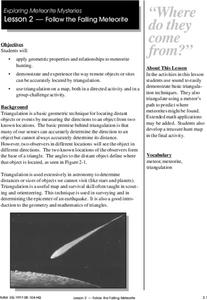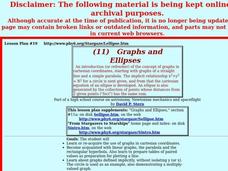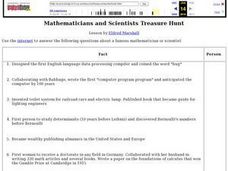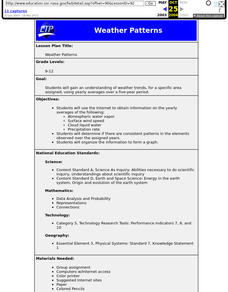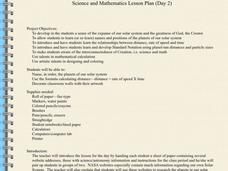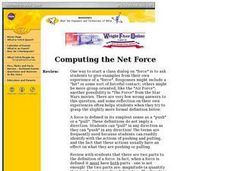Curated OER
Geography: Snow Cover on the Continents
Young scholars create maps of snow cover for each continent by conducting Internet research. After estimating the percentage of continental snow cover, they present their findings in letters, brochures or Powerpoint presentations.
Curated OER
Science: Breathing in Space
Pupils determine the amount of air they use during rest and activity. They conduct experiments to calculate the number of breaths needed to empty a jug of water by exhaling through a tube into the container. Then, they figure how much...
Curated OER
Using Computers for Statistical Analysis of Weather
Students use temperature, cloud cover and other weather data from the S'COOL website to statistically analyze weather around the country. They use computers to calculate and graph standard deviations, means and modes of the weather...
Curated OER
Kepler's Third Law
High schoolers use Kepler's third law to derive the velocity in a circular orbit of any radius, and identify the Earth escape velocity.
Curated OER
Follow The Falling Meteorite
Middle schoolers investigate the supposed traveling path of a meteorite. They use sound in order to triangulate the path. The results of the experiment are written on a map to display the path of the meteorite. The culminating activity...
Curated OER
Make Your Own "Weather" Map
High schoolers create their own "weather" map using data from x-ray sources. They analyze and discuss why it is important to organize data in a fashion in which is easy to read. They compare and contrast different x-ray sources using a...
Curated OER
The Adventure of Echo the Bat
Pupils compare different habitats based on satellite imagery. They identify land features in the satellite imagery.
Curated OER
Space: The Final Frontier
Sixth graders construct a graph to demonstration information that they've learned about the solary system. They also write or illustrate a sonar or lunar eclipse.
Curated OER
The Power of Compounding
Sixth graders examine the concept of compounding interest on invested money. They explore how much interest their money would earn through compounded interest. Students conclude that they should invest early and often.
Curated OER
Graphing With RXTE
High schoolers use data from the Rossi X-ray Tiiming Explorer (RXTE) satellite to analyze and graph.
Curated OER
Graphs and Ellipses
Students explore linear graphs, the parabola and the rectangular hyperbola.
Curated OER
Mathematicians and Scientists Treasure Hunt
In this Mathematicians and Scientists Treasure Hunt worksheet, students use the internet to research facts about a famous mathematician or scientists. Students read the fact on the worksheet and write the name of the famous individual...
Curated OER
Air can do work.
Students replicate the teacher demonstrations by changing the variables and predicting the outcomes.
Curated OER
Create your own plane.
Students create and or modify a plane to have the longest duration and/or flight distance, then record the flight and distance and repeat the activity for three flights Using calculators, students find the average of their three flights.
Curated OER
Weather Patterns
Students use yearly averages over a five-year period to understand weather trends for a specific area.
Curated OER
The Solar System
Young scholars research the characteristics of planets in our solar system. In this space science lesson, students create a solar system model with each planet arranged according to their distance from the sun. They solve problems using...
Curated OER
PROJECTILE MOTION
Students measure muzzle velocity, and predict range of a projectile device. In this motion lesson students complete a lab and explain the outcomes of their experiments.
Curated OER
History of Flight Timeline Activity
Scholars are introduced to the significant events that led to the development of today's modern forms of air travel. They create a timeline to identify the vital events that are related to man's flight. In addition, they research various...
Curated OER
Graphing the Four Forces
Using the Cartesian coordinate system, future flight experts plot points to determine whether or not an airplane will fly. With the four forces of weight, lift, drag, and thrust represented in different quadrants, your physics learners...
University of Colorado
Great Red Spot Pinwheel
The great red spot on Jupiter is 12,400 miles long and 7,500 miles wide. In this sixth part of a 22-part series, individuals model the rotation of the Great Red Spot on Jupiter. To round out the activity, they discuss their findings as a...
Curated OER
Computing the Net Force
Adorable little stick figures push and pull a cart of blocks to explain the push and pull of forces. Future physicists then define force and identify it in different situations on the instructional activity that follows. Concepts covered...
Teach Engineering
Solar Power
How much solar energy is available at my location? An engaging resource provides a presentation along with script to give the class background information on determining solar radiation. Pupils then work through a worksheet to estimate...
NASA
Supernova Chemistry
By measuring the wavelength, frequency, and intensity of electromagnetic radiation, scientists determine the temperature, density, and composition of far away items. Scholars rotate through ten lab stations using a spectroscope at each...







